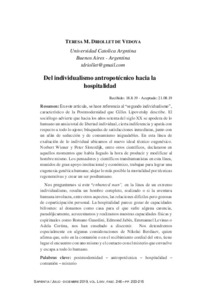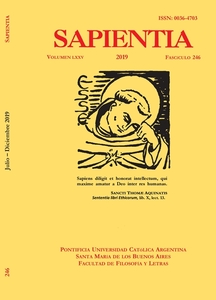Por favor, use este identificador para citar o enlazar este ítem:
https://repositorio.uca.edu.ar/handle/123456789/12085| Campo DC | Valor | Lengua/Idioma |
|---|---|---|
| dc.contributor.author | Driollet de Vedoya, Teresa | es |
| dc.date.accessioned | 2021-08-16T13:54:44Z | - |
| dc.date.available | 2021-08-16T13:54:44Z | - |
| dc.date.issued | 2019 | - |
| dc.identifier.citation | Driollet de Vedoya, T. Del individualismo antropotécnico hacia la hospitalidad [en línea]. Sapientia. 2019, 75 (246). Disponible en: https://repositorio.uca.edu.ar/handle/123456789/12085 | es |
| dc.identifier.issn | 0036-4703 (impreso) | - |
| dc.identifier.uri | https://repositorio.uca.edu.ar/handle/123456789/12085 | - |
| dc.description.abstract | Resumen: En este artículo, se hace referencia al “segundo individualismo”, característico de la Postmodernidad que Gilles Lipovetsky describe. El sociólogo advierte que hacia los años setenta del siglo XX se apodera de lo humano un ansia total de libertad individual, cierta indiferencia y apatía con respecto a todo lo ajeno; búsquedas de satisfacciones inmediatas, junto con un afán de seducción y de consumismo inigualables. En esta línea de exaltación de lo individual ubicamos el nuevo ideal técnico eugenésico. Norbert Wiener y Peter Sloterdijk, entre otros científicos, declararon en aquellos momentos que había llegado la hora de producir y modificar al hombre mismo. Los pensadores y científicos transhumanistas en esta línea, munidos de gran apoyo institucional y económico, trabajan para lograr una eugenesia genética humana; alejar lo más posible la mortalidad por técnicas regenerativas y crear un ser posthumano. Nos preguntamos si este “enhanced man”, en la línea de un extremo individualismo, resulta un hombre completo, realizado o si la aventura humana involucra, entre otros aspectos, las relaciones difíciles pero gozosas de coparticipación personal. La hospitalidad parece gozar de capacidades bifrontes: al donarnos como casa para el que sufre alguna carencia, paradójicamente, acrecentamos y realizamos nuestras capacidades físicas y espirituales como Romano Guardini, Edmond Jabès, Emmanuel Levinas o Adela Cortina, nos han enseñado a discernir. Nos detendremos especialmente en algunas consideraciones de Nikolai Berdiaev, quien afirma que, solo en la comunión o en el recibimiento cordial del otro, tiene lugar el encuentro con uno mismo y el contacto con el misterio que envuelve y escapa a todo lo humano. | es |
| dc.description.abstract | Abstract: In this article, we refer to “the second individualism" characteristic of Postmodernity, described for Gilles Lipovetsky. The sociologist warns that around the 1970s, a total desire for individual freedom, indifference and apathy towards everything that is foreign to us, a search for immediate satisfaction together with an unparalleled desire for seduction and consumerism, took hold of the human being. In this line of exaltation of the individual we find the new eugenic technical ideal. Norbert Wiener and Peter Sloterdijk, among other scientists, had declared that the time had come to produce and modify man himself. The transhumanist thinkers and scientists in this line, armed with great institutional and economic support, work to achieve human genetic eugenics; to keep mortality as far away as possible by regenerative techniques and to create a post-human being. We wonder if this “enhanced man¨ is a realized man. Hospitality seems to have two sides: by giving ourselves as a home for those who are in need, paradoxically, we increase and realize our physical and spiritual capacities, as Romano Guardini, Edmond Jabès, Emmanuel Levinas and Adela Cortina have taught us to discern. We will dwell in particular on some of Nikolai Berdiaev's considerations, who affirms that only in communion or in the cordial reception of the other does the encounter with oneself take place and the contact with the mystery that envelops and escapes all that is human. | es |
| dc.format | application/pdf | es |
| dc.language.iso | spa | es |
| dc.publisher | Pontificia Universidad Católica Argentina. Facultad de Filosofía y Letras | es |
| dc.rights | Acceso abierto | * |
| dc.rights.uri | http://creativecommons.org/licenses/by-nc-sa/4.0/ | * |
| dc.source | Sapientia. 2019, 75 (246) | es |
| dc.subject | INDIVIDUALISMO | es |
| dc.subject | POSMODERNIDAD | es |
| dc.subject | ANTROPOLOGIA FILOSOFICA | es |
| dc.subject | TECNOLOGIA | es |
| dc.subject | HOSPITALIDAD | es |
| dc.subject | COMUNION | es |
| dc.subject | MISTERIO | es |
| dc.title | Del individualismo antropotécnico hacia la hospitalidad | es |
| dc.title | Anthropotechnical individualism to hospitality | es |
| dc.type | Artículo | es |
| uca.disciplina | FILOSOFIA | es |
| uca.issnrd | 1 | es |
| uca.affiliation | Fil: Driollet de Vedoya, Teresa. Pontificia Universidad Católica Argentina; Argentina | es |
| uca.version | publishedVersion | es |
| item.grantfulltext | open | - |
| item.fulltext | With Fulltext | - |
| item.languageiso639-1 | es | - |
| Aparece en las colecciones: | SAP - 2019 Vol LXXV nro. 246 | |
Ficheros en este ítem:
| Fichero | Descripción | Tamaño | Formato | |
|---|---|---|---|---|
| individualismo-antropotecnico-hospitalidad.pdf | 316,75 kB | Adobe PDF |  Visualizar/Abrir | |
| cover_issue_355_es_AR.jpg | 123,08 kB | JPEG |  Visualizar/Abrir |
Visualizaciones de página(s)
73
comprobado en 30-abr-2024
Descarga(s)
77
comprobado en 30-abr-2024
Google ScholarTM
Ver en Google Scholar
Este ítem está sujeto a una Licencia Creative Commons

